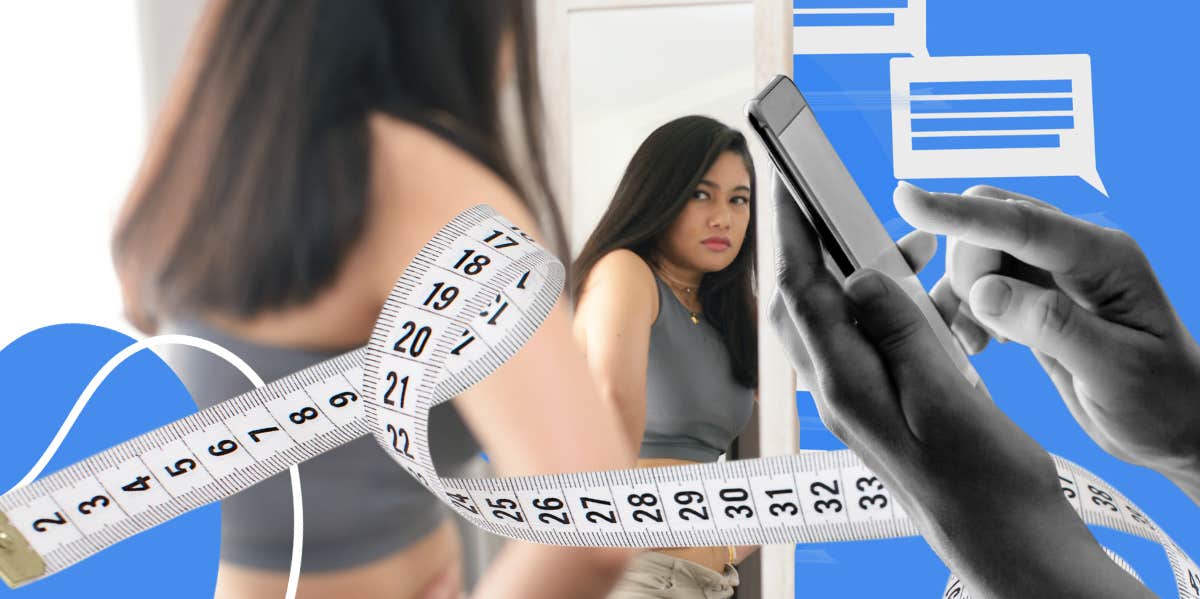6 Toxic Things That Do Incredible Harm To Your Body Image
What's really causing unrealistic beauty standards?
 themotioncloud | Jelena Stanojkovic | electravk | Getty Images / Billion Photos | Canva
themotioncloud | Jelena Stanojkovic | electravk | Getty Images / Billion Photos | Canva As much as we move forward when it comes to body acceptance, we only seem to get so far before something comes along and makes us, as a society, realize that we still have a lot of work to do.
We've known for a long time that fashion magazines play a major part in body image, as well as the media, as a whole, but they're not alone.
With the ever-changing world that is constantly shoving new media and new body standards in our faces all the time, you might not even be aware of just how much everyday technology is taking a toll on how we view our bodies and the bodies of those around us.
Here are 6 toxic things that do incredible harm to your body image:
1. Facebook
The social media platform that started it all has been blamed for lots of things. Not only has it become a major sucker of time, but it's also been linked to breakups and divorce.
In addition to those findings, researchers have also found that the more time young women spend on Facebook, the more obsessive they become about their eating and exercise habits. It's all that comparing their own bodies and that of their friends that creates negative feelings and self-doubt. It also doesn't help that the "Like" button, for some, is the very definition of acceptance.
2. Celebrity Instagram accounts
Remember when Beyoncé supposedly Photoshopped a thigh gap on one of her photos before she put it on Instagram and how the world freaked out? Everyone and their mother had something to say about the self-proclaimed feminist who may or may not have altered a photo to make herself appear thinner. If she did, that's her thing, but the problem with this is that if your idol can't accept her already near-perfect body, how are we supposed to accept ours?
3. Selfies
It would kind of make sense that one of the most self-involved practices out there would eventually be held accountable for something bad, but in this case, selfies themselves aren't entirely to blame. Instead, it's SkinneePix, an app that you can use on your photos to look up to 15 pounds lighter in seconds.
Although it was originally created for overweight adults so they could see just how great weight loss would look on them, it's teens who are flocking to it. According to Lauren Dixon at the Center of Addiction and Mental Health in Toronto, "The majority of young girls wouldn't develop an eating disorder because of an app like this, but some might be more vulnerable and it could contribute." And I think we can all agree that even one girl with an eating disorder is one too many.
4. Reality TV
With shows like The Biggest Loser and The Bachelor depicting "real" people, it's no wonder that reality TV is doing a number on body image fantasies and realities. While The Biggest Loser does promote a healthy lifestyle it also, according to Dr. Naomi Crafti who works at Eating Disorders Victoria, the show also shows "people doing things that are physically dangerous and they're made to feel bad about themselves." And let's not even get started on shows like Keeping Up with Kardashians and The Housewives of Wherever, and the plastic surgeries going on with those ladies.
5. Phone apps
Did you know that there's an app that allows you to "perform" plastic surgery on yourself? Not by wielding a knife and some series of pain meds, but with just a few clicks the app Plastic Surgery Simulator, whose slogan is "beauty is a right," can give you the D-cup you've always wanted or a profile you've been dreaming of since puberty.
While it may seem harmless, similar to the effect SkinneePix has on selfies, the Plastic Surgery Simulator can lead to obsessiveness about one looks and therefore create a negative body image. Of course, this is just one of many apps that can put your head in a tailspin and make you second-guess your physical and body type.
6. Twitter trolls
If there's one place where the trolls just let themselves run wild, it's on Twitter. If you happen to be one of the thousands of users who DON'T have your account privatized, then there’s a good chance you've had a run-in with one of them. The problem with Twitter is someone can hide behind a vague handle name, drop an insult, then run.
Actresses with what's considered "atypical" bodies like Mindy Kaling and Gabourey Sibide have found themselves on the receiving end of such insults, but lucky for them they can dish it out right back. Someone who is already struggling with their body image could possibly be pushed over the edge into further insecurity with just a few cruel words from a total stranger. You can tell yourself they're called trolls for a reason, but still, it can hurt like no other.
Amanda Chatel is an essayist and intimacy health writer for Yourtango, Shape Magazine, Hello Giggles, Glamour, and Harper's Bazaar.
